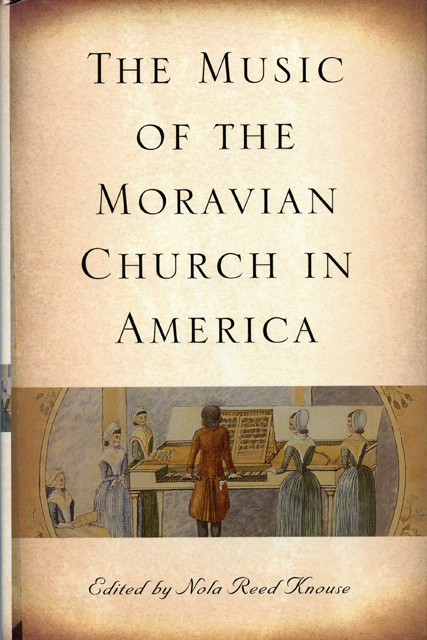Book contents
- Frontmatter
- Contents
- List of Illustrations
- Foreword
- Preface
- Acknowledgments
- 1 The Moravians and Their Music
- 2 Moravian Worship: The Why of Moravian Music
- 3 Hymnody of the Moravian Church
- 4 Moravian Sacred Vocal Music
- 5 The Organ in Moravian Church Music
- 6 The Role and Development of Brass Music in the Moravian Church
- 7 The Collegia Musica: Music of the Community
- 8 Music in Moravian Boarding Schools through the Early Nineteenth Century
- 9 The Piano among the Moravians in the Eighteenth and Nineteenth Centuries: Music, Instruction, and Construction
- 10 Moravian Music: Questions of Identity and Purpose
- Appendix 1 Biographical Sketches
- Appendix 2 A Moravian Musical Timeline
- Bibliography
- List of Contributors
- Index
- Eastman Studies in Music
10 - Moravian Music: Questions of Identity and Purpose
Published online by Cambridge University Press: 10 March 2023
- Frontmatter
- Contents
- List of Illustrations
- Foreword
- Preface
- Acknowledgments
- 1 The Moravians and Their Music
- 2 Moravian Worship: The Why of Moravian Music
- 3 Hymnody of the Moravian Church
- 4 Moravian Sacred Vocal Music
- 5 The Organ in Moravian Church Music
- 6 The Role and Development of Brass Music in the Moravian Church
- 7 The Collegia Musica: Music of the Community
- 8 Music in Moravian Boarding Schools through the Early Nineteenth Century
- 9 The Piano among the Moravians in the Eighteenth and Nineteenth Centuries: Music, Instruction, and Construction
- 10 Moravian Music: Questions of Identity and Purpose
- Appendix 1 Biographical Sketches
- Appendix 2 A Moravian Musical Timeline
- Bibliography
- List of Contributors
- Index
- Eastman Studies in Music
Summary
Before the founding of the Unitas Fratrum, Jan Hus advocated congregational song in the vernacular. Music has been an integral part of the life of the Moravian Church since its very beginnings. Tradition holds that the ordination of the first ministers of the Unitas Fratrum in 1467 was marked by the singing of a new hymn. The Unitas Fratrum published an astonishing array of hymnals, providing an abundance of texts for its members to use in sharing their faith, strengthening their community, and steeling their souls in the face of turmoil and persecution. These hymnals were published in Czech, German, and Polish, reinforcing the young church's insistence on worship in the language of the people.
Hymnals produced by the Unity included texts by members of the Unity and by others, reflecting the Unity's ecumenical openness. When successive hymnals were printed, the texts that were retained were often revised to reflect current theological needs and understandings. This practice has continued to the present day, causing some discomfort as people must become accustomed to the new wording, but also allowing the hymnals to reflect and express the enduring beliefs of the church in contemporary language and interpretation.
Most of the Unity's hymnals of the sixteenth and seventeenth centuries included tunes as well—a laborious and costly enhancement, especially in light of the tender age of the art of printing. Education was a vital part of the Unity's ministry as well, but even Comenius, himself highly educated and renowned for his educational reforms, urged that the hymns be kept simple so that those without formal education would be able to profit from them.
The renewal of the Moravian Church in the eighteenth century saw the flowering of many sorts of music, instrumental and vocal. With their emphasis on community and deemphasis on individualism, very few of these works are for solo performer, or even for two performers; most of the works by Moravian composers are for voices with chamber orchestra. With few exceptions, instrumental works written by Moravians during the eighteenth century are for three or more players.
For the Moravians, music helped to create and confirm an international consistency and conformity of life and culture across several continents.
- Type
- Chapter
- Information
- The Music of the Moravian Church in America , pp. 252 - 266Publisher: Boydell & BrewerPrint publication year: 2009



